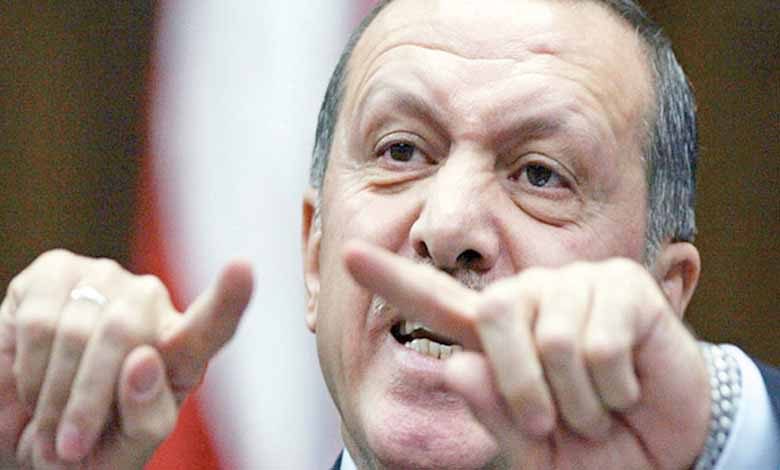Turkey Sinks in Economic Chaos.. And Erdoğan Wastes their Resources Abroad

In Turkey’s economic mess, government policies have failed to save the economy and relieve the public of a difficult financial burden, while Erdoğan and his men have spent billions of dollars on the mercenary and soft power abroad in an effort to achieve his expansionist ambitions.
Collapse of the economy
Turkish President Recep Tayyip Erdogan deeply acknowledged Turkey’s financial problems in a speech at the annual conference of the ruling Justice and Development Party (AKP) last week in the Turkish capital Ankara.
He told the AKP delegates : “Now is the time to work harder, to produce more, to speed up, I want citizens to invest in foreign currencies and gold that are held back home, our national wealth, in different financial instruments for our economy.”
According to The National, Erdogan’s speech was not idle. A few days ago, for the third time in 20 months, Erdogan fired the central bank governor. The decision to dismiss Naji Ajebal was shocking to investors, who raised interest rates two days ago, in an attempt to curb high inflation.
Analysts and investors who saw his four-month term as a restoration of credibility, and replaced him with Kavoglu, a pro-government columnist, former banker and AKP MP, who is said to share Erdogan’s unconventional view on inflation and interest rates.
When the markets opened Monday, the Turkish lira lost 15% of its value, falling near their record level against the US dollar before regaining some of their strength.
Turkey’s major stock market has backtracked on gains during the year and registered its worst expansion in two days since the 2008 financial crisis. The Economist described Mr. Agbal’s release as a “disaster”, while prominent Turkish economist Mustafa Sonmez questioned whether Erdogan had committed economic suicide.
Record poverty rates
Since the currency crisis in mid-2018, the lira has lost nearly half their value against the dollar and Turks have become increasingly reluctant to watch their savings evaporate.
The president urged his worried compatriots to invest in Turkish tools, highlighting the benefits of Islamic tools in particular, but many have other ideas. However, these proposals are not empty statements that do not help citizens get out of this crisis.
Last month, the common suicide of a young couple from Istanbul, who left their one-year-old with a neighbor, highlighted how more financially challenged Turks are taking the most ruthless steps.
Just last week, the Union of Turkish Musicians and Artists announced that more than 100 musicians had committed suicide since the beginning of the epidemic, most of them having lost their jobs and received inadequate government assistance.
The Coronavirus has also pushed more than 1.5 million Turks into poverty, and about 20 per cent of the population now lives below the poverty line.
About seven out of 10 have large debts, one in 3 has difficulty buying food or heating their homes, and 40% of people under 30 are unemployed.
Debt exploitation
Having lost popularity, the AKP sought to rally their base by highlighting their conservative tendency and Islamic good faith.
Instead of working to resolve the people’s economic crises, the government began to exploit the Religious Affairs Directorate (Diant) to encourage the people to austerity, and to write Friday sermons to more than 82,000 mosques that praise poverty and obedience to the sultan.
She also issued fatwas advising people to reduce unnecessary purchases and go to farmers markets late in the afternoon to save money. Another sermon reminded Turks that “poor people are the closest to God”.
Last week, as markets rocked, the imam of the famous Aya Sophia Mosque in Istanbul tweeted : “God will test the believers with fear and hunger, as their lives and properties deteriorate, but God will reward the patient in the end.”
But the president is singing a different tune, arguing in his speech that the recent volatility does not reflect the fundamentals of the economy, and pointed to thousands of new companies and strong infrastructure as reasons for the Turkish economy heading towards a new peak.
Erdoğan’s Soft Powers
Despite the collapse of Turkey’s economy and the government’s failure to resolve crises, Erdoğan’s men wasted state resources to achieve his expansionist ambitions.
Billions of dollars were spent on mercenaries in Libya, Syria, and Somalia.
Erdoğan is also using soft power in poor countries to aspire to, under the banner of humanitarian aid.
According to observers, showing humanitarian aid to Turkey in poor countries is merely a way to recruit mercenaries and send them to conflict zones.
The Erdogan government took an interest in foreign aid, ignored the people’s domestic aid and left them facing economic crises and the epidemic on their own, and imposed more taxes on them.
A Turkish plane recently arrived in Bangladesh to rehabilitate a Rohingya hospital, in addition to Turkish assistance in building mosques and hospitals in Syria, especially Idlib.












